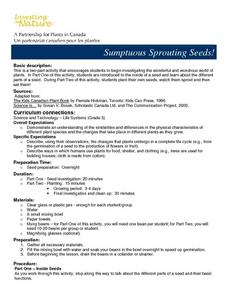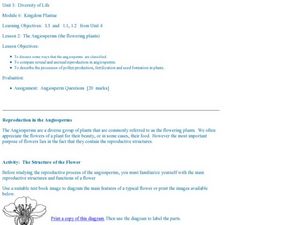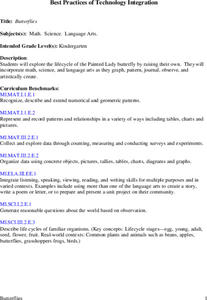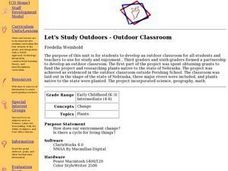PBS
Season Seeking
It's a time of change. A hands-on activity engages young scientists in a lesson highlighting the change of seasons. They brainstorm indicators of season changes in nature and then look for them. Next, they record observations in a field...
Core Knowledge Foundation
A Time for All Seasons - Spring
Celebrate the arrival of spring with this fun primary grade science unit. Engaging young scientists with a variety of hands-on activities and inquiry-based investigations, these lessons are a great way to teach children about seasonal...
Curated OER
Sumptuous Sprouting Seeds!
Third graders investigate the wonderful and wondrous world of plants. They examine the inside of a seed, explore the different parts of a seed, plant their own seeds, watch them sprout and then eat them! They describe, using their...
Curated OER
POLLINATION DEMONSTRATION
Third graders study the terms pollen and pollination. They use appropriate vocabulary in describing their investigations, explorations, and observations (e.g., stem, pistil, stamen, flower). They describe, using their observations,...
Curated OER
Pollinator Habitats
Students read and discuss background information included with this lesson. They brainstorm the best sources for developing a list of native or migratory pollinators. Students work in groups to design habitats based on information...
Curated OER
Now You See It, Now You Don't
Students explore organic and inorganic objects. In this environmental lesson students perform a composting experiment using flowers in different soils. Students record their observations.
Curated OER
Predicting the Greening of Spring With Red Emperor Tulips
Students examine seasonal changes by watching tulip plant growth across the continent utilizing the Journey North website. They develop hypotheses as to why the plants emerge and grow where they do.
Curated OER
Growing Tomatoes from Seed
In this growing tomatoes worksheet, learners experience and participate in the process of growing tomatoes over a three or four month span of time. Students follow six directives in producing tomato plants.
Curated OER
Thinning and Transplanting
Middle schoolers identify and observe one plant per section in their quad and to transplant the surplus seedlings to empty quads and interpret why this is important. They then discuss the purpose of thinning and transplanting. Finally,...
Curated OER
The Angiosperms
Students study angiosperms and their classifications. In this investigative instructional activity students compare the sexual reproduction of angiosperms and seed formations.
Curated OER
Plant Diversity
In this nonfiction comprehension worksheet, learners read the selection on plant diversity and answer 10 questions that include true/false, short answer, multiple choice, and fill in the blank.
Curated OER
If It Smells Good, Is Edible, and Attracts Wildlife, Then It's a Practical Garden
Students explore landscape design. In this practical gardening lesson, students design landscape plans that call for shrubs, trees, and plants that can be used for aesthetics, cooking, and wildlife.
Curated OER
Butterflies
Students will explore the life cycle of the Painted Lady butterfly by raising their own. They will incorporate math, science, and language arts as they graph, pattern, journal, observe, and artistically create.
Curated OER
Let's Study Outdoors - Outdoor Classroom
Students research native plants. They identify the plant by scientific name, size, amount of water needed and color. Pupils measure and plot an area of school property. Students create an outdoor classroom. Additional cross curriculum...
Curated OER
The Bulbs: Camas and Daffodil
Fourth graders become aware of the importance of the camas bulb to the Nez Perce people, they learn the parts of plants, and gain understanding of the interdependence of Nature. They study about the possible causes and outcomes of global...
Curated OER
Gardening for Beauty, Food, and Enjoyment
First graders create their own garden. In this plant lesson, 1st graders discover the essential elements for a plant to grow. They planted their own garden and read the amount of space needed and the sunlight preferred for each plant.
Curated OER
The Great Plant Escape-Plant Parts
In this plant parts worksheet, students use provided links to compete questions about plant and their parts. Suggestions and links for additional resources are given.
Curated OER
Grow Your Character Bookmarks
Students make bookmarks out of seed paper to study the growth of seeds and complete an activity for the Six Pillars of Character. In this science and character instructional activity, students describe the stages of growth of plants and...
Curated OER
Tulips: Predicting the Arrival of Spring
Learners use the blooming of tulips as a tool to measure spring's journey north. They predict when tulips bloom at 13 selected Journey North gardens in various geographic regions.
Tech Museum of Innovation
Seed Dispersal
Engineering challenges are not just man-made ... nature has its own set of them. A hands-on STEM activity has groups designing a seed dispersal system. Each group can only use one sheet of paper — a tough task!
EnLiST
Trap Your Own Insects: What’s in Your Backyard?
Young entomologists construct three types of insect traps—pitfall, pollinator, and panel—before setting their traps out and observing what they caught. They then observe what types of insects the different traps attract.
Curated OER
Growing Tomatoes From Seed Activity
In this growing tomatoes worksheet, students plant tomato seeds in February, and follow their growth through the summer break. They observe and investigate the plant growth from seed to plant.
Curated OER
Window Gardens
High schoolers use a plastic sandwich bag containing a damp paper towel taped to a window as a model system to observe the germination and early growth of radish seeds. They are challenged to pose a question about seed germination and...
Curated OER
Renewable vs. Non-Renewable Resources
Here's a fine lesson on renewable and non-renewable sources of energy for your 5th graders. In it, learners list a number of natural resources on the board, then try to sort the resources into appropriate categories. This helps them to...

























